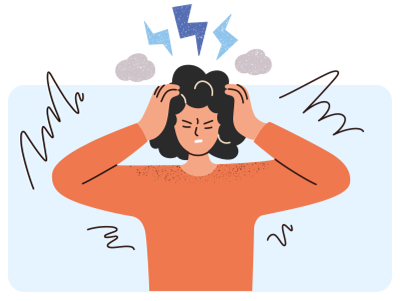Financial health is a huge factor in the quality of our lives, yet it’s overlooked in many of the ways we evaluate wellness.
Your financial wellness informs your physical and mental health. And it’s not a stretch to see how a bad credit score or unpaid loan could impact how you feel stress — and how you formulate a sense of self-worth.
Conversation around financial health is often stifled by the social taboo of talking about money. It’s common to feel a sense of shame, isolation and hopelessness when going through a difficult period in your financial life.
So how do you break through? It starts with a little self-reflection.
How do you define financial health, anyway?
The definition of financial health is two-pronged: It’s both your ability to work towards your financial goals and your capacity to overcome money problems.
To illustrate, let’s consider two people who have similar income and have recently been hit with a major, unexpected car repair bill.
Financial Health Examples

Person 1 is upset about the situation, but not stressed: They’ve put money into a rainy day fund for situations just like this.
Rebuilding those savings might mean adjusting their monthly budget, but they have control over their income and expenses. They feel capable of moving on from their unexpected car repairs without much worry.

Person 2 feels upset and deeply stressed by this unexpected bill.
They have not been putting their money away into savings, rely on credit to get by and do not have plans for their finances beyond their next paycheck.
This car repair threatens to put them deeper in debt — they do not feel in control of their finances.
Take a moment to assess your own financial health. Here are the questions you need to ask yourself:
1. Can I afford an emergency?
No one ever plans to crash their car, lose their job or drop everything to care for a loved one. But people with healthy finances have a plan for when catastrophe strikes: an emergency fund.
If you think an emergency could put you into immediate financial hardship, you might want to step back and assess your spending. Financial health experts often say that building an emergency fund should be the highest priority, even before other savings.
Learn how to prioritize your financial goals: Read the Guide >
2. Am I making progress towards my financial goals?
It doesn’t matter if you earn $10,000 or $1 million per year, you probably have aspirations to travel, buy a home or save for retirement.
One reliable indicator of your personal financial wellness is your progress towards those financial goals. If you’re putting money into savings — no matter how small the amount — it’s a sign that you’re able to provide for yourself beyond your immediate needs.
Not making progress? Start a 31-Day Financial Wellness Plan >
3. Do I have a choice in how I manage my money?
Sometimes, we believe that we have more choices for how we conduct our lives than we actually do.
This is especially true when it comes to our financial options. From the cost of living to the type of bank in your neighborhood, external factors impact your options for money management.
Taking your personal circumstances into account, consider your options for things like loans, credit cards and other banking services. If your budget, debt or credit score impacts your ability to access these opportunities, then your financial health may be more compromised than at first glance.
Financially healthy people are able to choose the institutions, credit cards, loans and programs they want to work with, while those lacking options can get stuck with expensive or subpar services. But the good news is that healthy habits can help you maintain stability — and improve the options available to you.
Up Your Financial Literacy: Check Out Our Overview >
4. Am I in control?
Especially for those digging their way out of debt, a sense of control can feel unattainable. The inability to save, afford monthly payments or qualify for loans can undercut your motivation, too. Feeling out of control may also be a clue that your spending habits, relationships and career need attention — and, potentially, change.
But if you feel pressured, trapped or resigned to your financial situation, there’s hope for you. By simply completing this assessment, you’ve begun to rethink your finances. And the best part? You don’t have to start your journey alone.
Here are a few trusted resources to help you regain power over your financial life:
Need to ask someone about your debt options?
In one call with an expert at Accredited Debt Relief, you can get a personalized financial profile, answers to your questions about loans and debt consolidation, plus support from people who get what it’s like to live with the stress of debt.
